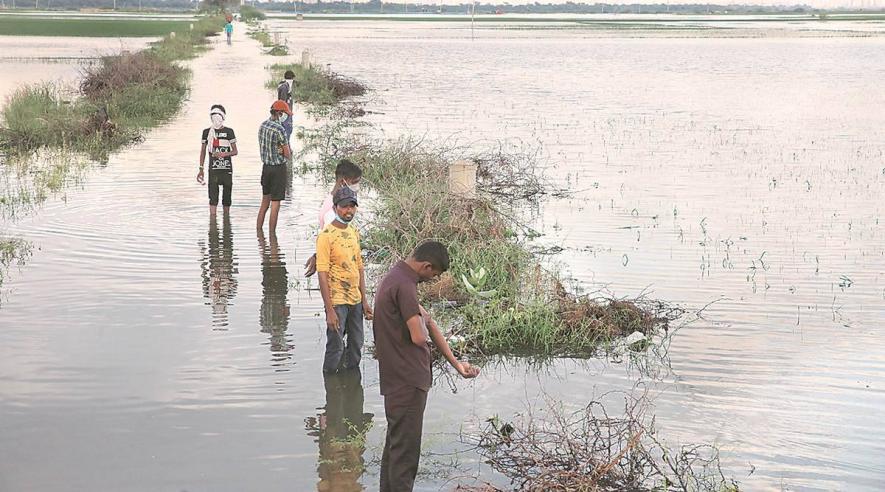Delhi Village Farmers Pay Price for Urbanisation

Image Courtesy: The Indian Express
Saving his crops from the overflowing local pond spread across five acres in Garhi Bakhtawarpur village, in Narela, seems to be an eternal battle for Ritesh Rana.
Pointing to an inundated patch of farms, Rana said that his family owns 30 acres. However, owning such prime land in the national capital is not beneficial as they remain inundated for more than eight months in a year.
The residents of the village maintain that the pond caters to the needs of Bakhtawarpur and other neighbouring villages, like Palla, Majra and Hiranki. With the advent of urbanisation, the drains of the villages turned into a pond. As the population of the villages exploded with migrants settling down on the outskirts, the wastewater emanating from the locality flooded the pond and killed the prospects of getting any income from the crops.
Rana told Newsclick that though he does not want to sell his land, unlike several other villagers who turned into property dealers, the conditions are unsustainable. “For years, land here was sold at very cheap rates. We did not sell our land because we wanted to save it for our future generations. But the conditions are forcing us to reconsider our decision. I have been pleading with the authorities to make a new drain from Palla to Hiranki. The infrastructure here is 25 years old. Even though the villages of outer Delhi contributed heavily to the electoral success of the Aam Aadmi Party twice, we are at receiving end now.”
Showing a file full of complaints, Rana said, “Public works department (PWD) officials said that tenders for the construction of a drain had been invited in the last nine years. But nothing happened. In response to one such complaint, the PWD department in its note dated August 27, 2021, said that the contract was awarded for the construction of an RCC drain. Tentatively, work will start within 10 days.”
Another resident Sumit Rana told Newsclick that he even tried growing short-term and off-season vegetables to minimise the risk posed by the flooded drain in vain. Pointing at the bund, Rana said, “It can break anytime. We have already paid about Rs 2.5 Lakh in constructing a temporary bank to contain the water. With no crops, how would a farmer’s family survive? Youngsters like me are looking for jobs outside.”
The pandemic worsened the crisis. “With no money, the families literally collapsed with the demise of several members. They could not save them because of lack of money,” Rana said.
Paras Tyagi, cofounder, Centre for Youth, Culture, Law and Environment, who has been helping the villagers, blamed political parties who allowed uncontrolled urbanisation without making necessary provisions for essential services—like hospitals, colleges, schools, drainage system and community centres—for the crisis.
Showing the map of the revenue department which prohibits settlements outside the inhabited area of the village under the Delhi Land Reforms Act, 1954, Tyagi told Newsclick, “When we superimpose the map on Google Earth through our software, we find an entirely different picture. There are large settlements because everybody wanted a home in the national capital even if it was without the basic amenities. The lives of the communities living in the villages as well as the people in the new settlements was impacted.”
Tyagi said that the unique status of Delhi made it difficult to agitate collectively as their rights were snatched away by bodies like the Delhi Development Authority.
“In the 1990s, the government eliminated gram panchayats, which could take action on behalf of their communities, through an arbitrary order. Similarly, the administration ensured that land couldn’t be consolidated in any of the villages. The municipal corporations focussed on the new settlements, known as Kuchcha Colonies, because the councillors were elected with the help of their votes,” he added.
The Delhi government, through an order issued by then-secretary SR Sharma on January 25, 1990, said: “In exercise of powers conferred by clause c of subsection 1 of Section 161 of Delhi Land Reforms Act, 1954, and all other powers enabling him in behalf, the Administrator of Union of Territory of Delhi is pleased to declare and direct that the duties, powers and functions of Gaon Panchayats are aforesaid under the said Act shall be discharged exercised and performed by the deputy commissioner Delhi until further orders.”
Shyam Sunder Garg, chief engineer, PWD, did not respond to the questions of Newsclick till the time of the publication of this story.
Get the latest reports & analysis with people's perspective on Protests, movements & deep analytical videos, discussions of the current affairs in your Telegram app. Subscribe to NewsClick's Telegram channel & get Real-Time updates on stories, as they get published on our website.
























